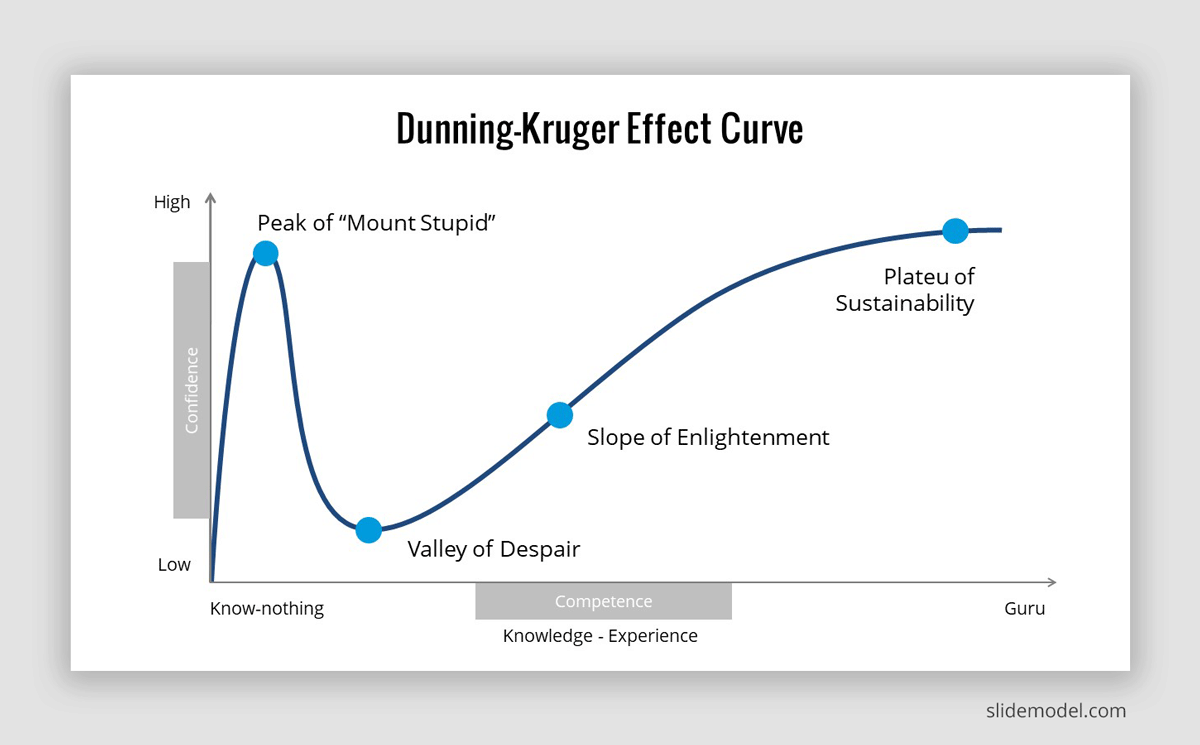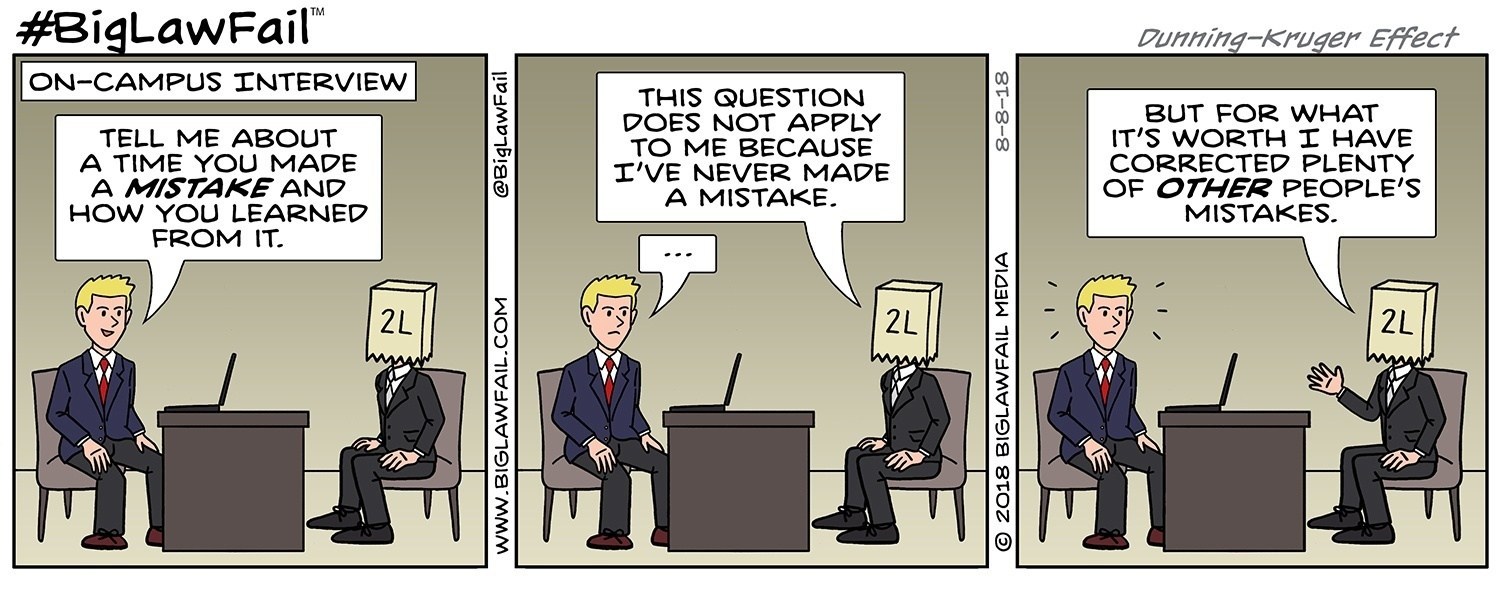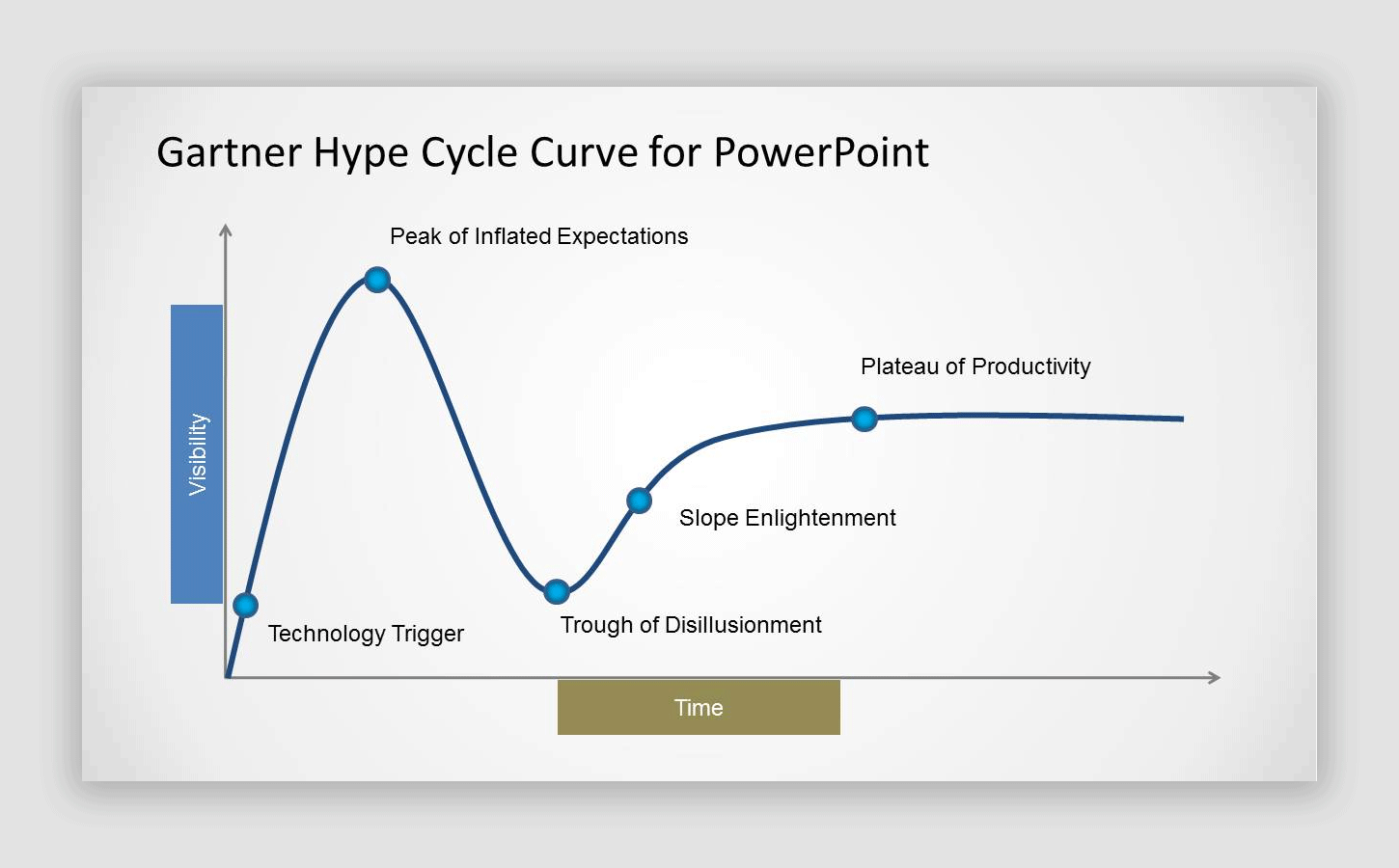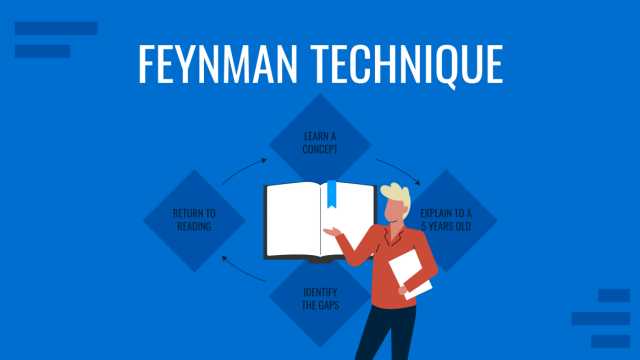
Many people claim to be experts at something they are simply not good at. Despite this, they can claim to be exceptionally good at the task. This includes not just people boasting about something to gain attention or praise, but people who believe to be competent when they are not. This is widely known as the Dunning-Kruger effect.
What is the Dunning-Kruger Effect?
The Dunning-Kruger effect is a cognitive bias. People suffering from the Dunning-Kruger effect have a low ability to perform a certain task and overestimate their capabilities. This is because, without metacognition and self-awareness, people can be deprived of the ability to objectively judge competence and incompetence.

In 1995, a man named McArthur Wheeler robbed a bank and even smiled at the camera, thinking he was invisible. The reason for this was his belief that applying lemon juice would make him invisible to cameras. This led him to rob a bank in broad daylight. However, to his surprise, he was caught shortly after the robbery. At the time of arrest, he is said to have mumbled ‘the juice’? This was Wheeler surprised by the inability of lemon juice to hide his face from the cameras. The investigation concluded that Wheeler was neither a drug addict nor crazy. He was simply unable to judge his lack of understanding of lemon juice. In other words, he was unable to understand just how incompetent he was!
Following McArthur Wheeler’s incident, David Dunning and Justin Kruger conducted research titled “Why People Fail to Recognize Their Own Incompetence”, which highlighted how people can be ‘blissfully unaware’ of just how incompetent they are. Let’s take a look at the reasons behind what causes the Dunning-Kruger effect.
Why are People Affected by the Dunning Kruger Effect?
There are a number of reasons people fail to acknowledge their own incompetence. The most important thing to understand in this regard is that we can tend to consider others as ‘incompetent’ while falling prey to the Dunning-Kruger effect ourselves.
1. Overestimating Skills
One of the major causes of the Dunning-Kruger syndrome can be attributed to overestimating one’s skills. Many incompetent people tend to overestimate their capabilities due to multiple reasons. Some might do this because of being excessively praised by silver-tongued, manipulative subordinates, whereas others might not have enough practical experience to understand just how difficult a task can be. For example, many people with an inflated sense of expertise in public speaking after Death by PowerPoint can end up considering their presentation a success! Suffering from the Dunning-Kruger syndrome.
2. Failure to Acknowledge Mistakes
Imagine you are about to play a new outdoor game that seems easy. Now imagine that you begin playing it, realizing it is actually quite difficult and you’re simply not good at it. There are three ways you can go about this. You can continue playing the game by trying to learn it and improve, you can quit playing the game thinking it is difficult or you can overestimate your skills and think you are good at it or think that the other person is cheating! The third attitude mentioned in this example would lead you to fall prey to the Dunning-Kruger effect.
3. Peter Principle
The Peter Principle is the inability of people to deliver when they are promoted to a position. A good salesman isn’t necessarily going to be a good manager. Furthermore, those who are rigid and fail to learn from their mistakes are likely to repeat them. The Peter Principle can be deemed one of the major causes for people being unable to acknowledge their incompetence.
4. Toxic Leadership
In a previous post we discussed both the Peter Principle and toxic leadership in detail. Many incompetent bosses when faced with the Peter Principle can turn toxic and make life difficult for their peers. Such an attitude, if not checked by an organization’s control mechanisms can result in a leader suffering from the Dunning-Kruger effect.
5. Corporate Culture
When an organization’s control mechanisms fail or the corporate culture itself reinforces toxic leaders, the Dunning-Kruger effect isn’t difficult to find in the senior management. Many inefficient organizations frequently suffer from this conundrum. Countries with a corrupt and inefficient structure of governance often have such a culture within government led organizations. Similarly, many multinational corporations which have declined in recent years arguably suffered from leadership that wasn’t as competent as they pretended to be. It is worth asking the question if the decline of Nokia phones and the closure of famous companies like Toys R Us and A&P can be attributed to the Dunning-Kruger effect?
6. Societal Culture
Sometimes culture can play a role in reinforcing the Dunning-Kruger effect. For example, many Asian cultures give parents an inflated status, where children are expected to accept all types of ill-treatment by a parent without question. Similarly, some cultures based on a caste or creed-based system can result in some people being given the status of ‘royalty’. Even the incompetence of such people can be overlooked in society due to their caste or creed, reinforcing the Dunning-Kruger effect through cultural norms.

Source: BigLawFail
Tips for Avoiding the Dunning Kruger-Effect?
Avoiding the Dunning-Kruger effect can be easy if we are more considerate and avoid jumping to conclusions. Personal grudges, ego, low self-esteem, and the drive to appear better than others can all be the reasons that make one ignorant and incompetent. Here are a few tips to avoid the Dunning-Kruger effect.
1. Improving Confidence while Considering Facts
Understanding that no one is beyond the possibility of being ignorant can be the first step to avoid the Dunning-Kruger effect. A fine example of Plato’s account of Socrates, leading to the famous phrase, ‘I know that I know nothing’. This essentially means that one should not overestimate their capability and know when to stop and ponder over something or learn about something. Rather than claiming to be an expert at things beyond one’s capability and knowledge. Building knowledge over a period of time and being considerate will allow you to not only be a better judge of what is good or bad but also enable you to gain more confidence in your skills.
2. Improving Workplace Performance
The worst thing one can do at the workplace is to assume being an expert by simply consulting Wikipedia. Unfortunately, many people tend to do that nowadays. In order to improve workplace performance, you need to do things the hard way. Consistently updating your skillset and improving your knowledge by consulting reliable sources, coupled with experience will improve workplace performance. This will also allow you to be a better judge of your own competence. While it can be hard to acknowledge that a subordinate can know more than you, putting your ego aside will also help you learn from not only people high up but also ones you are meant to lead. Eventually making you a better leader.
3. Creating Harmony at the Workplace
It is likely that you might have been unwittingly mean to a coworker or took out your frustration on a subordinate. Either way, acknowledging mistakes, apologizing for bad behavior, and trying to genuinely care for your peers will help you create harmony at the workplace and avoid the Dunning-Kruger effect by avoiding things like the Peter Principle.
4. Carving Your Path to Climb the Career Ladder
Climbing the career ladder requires skill and important career considerations. Many people can get stuck at the same desk because of the Dunning-Kruger effect. This is because they can deem their skills to be adequate when they are not. Hindering growth both as an individual at the workplace and when climbing the career ladder.
5. Making Better Decisions
Suffice to say, by following the aforementioned, you can not only improve your workplace performance but also decision making in general. From making informed buying decisions to making sure you don’t ruin the relationships most dear to you. Avoiding the Dunning-Kruger effect can also help you elevate your quality of life with better decision making.
The Gartner Hype Cycle: Small Amounts of Effort Creates Large Amounts of Improvement
The Gartner Hype Cycle is a graphical representation of maturity, adoption, and the application of certain technologies socially.

The Hype Cycle by Gartner, Inc highlights the peak of inflated expectations and is a good example for understanding how companies can fall prey to the Dunning-Kruger effect due to ignorance. However, timely action to avoid decisions based on inflated expectations can help companies avoid pitfalls. Hence, small amounts of effort creates large amounts of improvements.
Final Words
A statement by Eric Schmidt, the former CEO of Google, warned that the ‘excess’ of social media is going to result in more regulations on the Internet. He also called social networks as ‘amplifiers for idiots and crazy people’. It is all too common to find people on social networking websites claiming to be experts on something they are not. Someone who just read a few lines on geophysics can end up contradicting a geophysicist on Twitter, claiming to have ‘accurate’ knowledge on the subject. Not to mention the ‘Flat Earth’ movement has become quite a phenomenon over the years. In the wake of a deluge of this behavior, we can safely assume that the Dunning-Kruger effect is more relevant today than ever before. But it’s not just people with a short attention span or bias ideas who are falling victim to it. Even knowledgeable people can end up sharing a news item from a shady website and inaccurate information.
The best way to avoid the Dunning-Kruger effect in the age of information, (including a lot of incorrect information), is to take a step back, verify facts, admit your mistakes, and make sure that you ‘know the things that you don’t know’!


